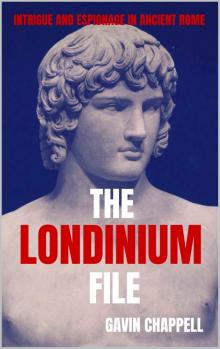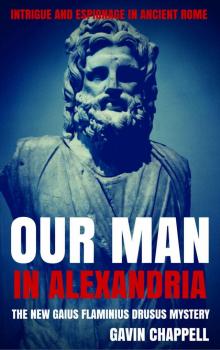- Home
- Gavin Chappell
Murder in Hadrian's Villa Page 2
Murder in Hadrian's Villa Read online
Page 2
Flaminius sprang from his seat and came sharply to attention. He recognised the first newcomer as Septicius Clarus, Praetorian Prefect, one of the joint commanders of the Praetorian Guard. He had been left in Rome while his colleague Marcius Turbo and two cohorts of the Guard travelled to Britain with the emperor.
Septicius Clarus grinned at Flaminius, and indicated that he should be at ease. ‘Greetings, tribune. How does the country air find you? Makes a change from Rome, eh?’
Flaminius had met his superior officer several times since accepting his new posting, but never before had the man been anything but coldly formal. It seemed that the country air found Septicius Clarus very well.
‘Greetings, prefect,’ Flaminius replied. ‘It’s a pleasure to come here again, under less hectic circumstances than my last visit.’
He looked inquiringly at Septicius Clarus’ companion, who smiled back faintly but seemed more interested in the empress.
‘My old friend Suetonius Tranquillus,’ Septicius Clarus explained affably. ‘Imperial secretary, librarian, historian. He doesn’t say much, but when he does you can’t shut him up, the old bore. Still, he has hidden depths.’
‘Indeed he does,’ said Sabina, hiding a yawn, and not rising to greet the two newcomers. ‘Both of you do. You’ve met the tribune professionally, of course, prefect. Suetonius Tranquillus, may I introduce you to Tribune Gaius Flaminius Drusus , the renowned and heroic rescuer of my husband?’
Suetonius Tranquillus studied Flaminius before speaking. The secretary was in his early fifties and had a craggy, introspective face, pale skin from spending too much time indoors, and a full beard like a Greek philosopher. There was an ink stain on the right side of his toga and his hair was needed combing.
‘So, this is the famous tribune, is it?’ he said at last in pompous tones. ‘I have indeed heard of Flaminius. I wasn’t present when the tribune so daringly rescued the emperor from certain death, but even in my offices word reached me of Flaminius’ deeds.’
Flaminius thanked him politely. He had never met the secretary before, though he had heard of him.
Sabina patted the couch beside her. ‘Come and sit with me, Suetonius Tranquillus,’ she said. ‘Say something clever. He’s so witty, you know,’ she told the company at large. ‘Composes wonderful epigrams.’
Suetonius Tranquillus sat down but said nothing. Either he was busy composing an epigram, or else he was tongue tied, but Flaminius saw him gazing sidelong at the empress. Septicius Clarus was not invited to sit. He stood by the steps leading outside, his helmet clasped under his arm, eyes narrow as he fanned his face with a scarf. Detecting a certain atmosphere in the chamber, Flaminius wished he was elsewhere. Even the crusty company of Chief Centurion Messalus would be preferable.
He heard a patter of footsteps and a giggling of voices from the passageway, and a group of handmaidens and other hangers-on came flocking in, clustering round the empress and cooing.
It was the same group he had met in the grounds, although they were now more modestly clad in stolas like the empress. Medea was among them. She offered him a weak, embarrassed laugh and joined the others with the empress. Also accompanying them was a much older woman, who had dark tangled hair and withered skin. Alone of her companions, she wore no cosmetics.
‘Girls,’ said the empress severely, ‘you’re late. Now sit down and tell me all about how you have been spending the morning.’
As the conversation turned distinctly feminine, Suetonius Tranquillus came to sit with Flaminius, clearly having had trouble with his epigrams. He had also not visited the bathhouse recently.
‘Women,’ the imperial secretary said. ‘Gaggle of hens. Can’t stand ’em—except our own dear empress, of course. I was married once. Worst time of my life. You’d not be married yet, young chap like you?’
Absently, Flaminius’ eyes strayed to Medea’s slim form, as she sat laughing beside the empress. ‘No,’ he said. ‘Not as yet. My duties have come between me and marriage. I’m sure I’ll settle down sooner or later.’
Suetonius Tranquillus disapproved. ‘Love ’em and leave ’em,’ he advised the tribune. ‘Don’t let them enmesh you in their web. Women have their uses, but if you let them get their claws into you they’ll run your life for you, run it into the ditch. A man’s best on his own.’
The empress called over to them. ‘Surely you’re not boring the young man with your dreary opinions, Suetonius Tranquillus? Let’s hear a bit more about you, tribune. Are you happy in your career as a soldier? Is it what you dreamed of as a boy?’
All the handmaidens turned and made cow eyes at him, much to his embarrassment.
‘I joined up because it was expected of me,’ Flaminius confessed. ‘Some people think I’m capable of more.’ Medea seemed to be making meaningful eye contact over the empress’ shoulder, but he glanced away.
‘But what would you most like to be?’ Sabina persisted. ‘Surely not a deskbound penman like this old bore?’ She gestured at Suetonius Tranquillus, who bridled, but said nothing.
‘Gaius is a clever man,’ Medea assured her. ‘He’s destined for great things. Perhaps he should study for the law.’
Sabina looked inquiringly at her handmaiden’s use of the tribune’s first name. ‘You’ve met?’ she asked. ‘But of course!—your former master governed Britain when Tribune Flaminius was with the Ninth Legion. Before our friend here saved my husband from that odious Rufinus Crassus. If only the man hadn’t died, he could have exercised the tribune’s legal skills when the senator was tried for his crimes!’
‘I wonder how that happened,’ Medea said thoughtfully. ‘How he came to die, I mean.’
Flaminius gave her a quick frown. She was being too obvious.
‘A sudden distemper, wasn’t it?’ said Sabina. ‘Perhaps there is someone who can do a better job of answering that question. My personal physician and perfumer, Erichtho of the Marsi.’
From among the handmaidens stalked the tall, leathery skinned woman Flaminius had seen earlier, dressed in diaphanous robes like the rest, but to Flaminius’ mind better suited to the black rags of a votary of Hecate. She looked a sight more like the sorceress Medea of the myths than Medea did, that was for certain.
Old and withered, she conveyed the impression someone had hung her up for years in the roof beams of a hillside hut up in the Apennines to dry in the smoke. Her thick black hair was a tangle that fell into her eyes, but did not conceal them: they were black and piercing. Evil eyes, Flaminius caught himself thinking with a superstitious shudder.
‘Well?’ Sabina prompted her. ‘You saw the senator’s body before it was taken away for cremation by his grieving family—grieving twice over due to the shame he had brought on them. How do you explain his death?’
‘It certainly looked like it could be a distemper, although some suggested he took poison,’ said Erichtho of the Marsi at last. Her voice surprised Flaminius by being as pure and clear as a mountain pool. She shrugged. ‘Perhaps he had confederates who gave him a fatal draught to take in just such an eventuality.’
Sabina turned to Flaminius with a laugh.
‘A fanciful breed,’ she said. ‘But a good physician for all my aches and little ailments.’ She smiled slyly. ‘I believe she also has been known to mix love philtres for my handmaidens. You know of the Marsi?’
Flaminius nodded. They were primitive hill dwellers, living in wandering tribes up in the pine forests of the mountains. A band of them had been yearly visitors to his father’s little farm in Latium. They had tried to sell charms and herbal remedies, some of which were even said to work. His father paid them a small stipend to go on their way and not trouble his household. Flaminius doubted if Erichtho had ever taken the Hippocratic Oath.
‘They make good soldiers, the men,’ commented the prefect, who had stood in a stony silence while all this was going on. ‘Had a few in my cohort when I was a young tribune, back in the Dacian Wars. The other men wouldn’t go near them, fearing witchcraft a
nd curses!’
‘Oh, enough chatter of poison and witchcraft!’ Sabina said. ‘How the conversation has taken such a morbid turn I will never know. Tribune Flaminius!’
He rose and stood to attention.
‘You are dismissed,’ the empress told him. ‘No doubt you have work to do. Myself, I have a little headache coming on. I shall be closeted with my physician for a while. The rest of you can amuse yourselves.’
Flaminius departed. Chief Centurion Messalus was waiting him outside with the two guards, and he fell into step as the tribune crossed the gravel path to the Praetorian barracks. Entering the building Flaminius dismissed his men, went to his new office and began to settle in.
The tribune’s office overlooked the peristyle at the back of the palace. Looking up from some tedious paperwork some hours later as night was falling, Flaminius was surprised to see Sabina again, showing no sign of indisposition, walking arm in arm with Septicius Clarus.
A movement from the depths of the shrubbery attracted the tribune’s gaze, and as the pair walked out of sight into the palace, Flaminius saw Suetonius Tranquillus step from the bushes. He watched the man and woman until they were out of sight. Then he turned and strode away, muttering inaudibly. It was too dark to fully make out his expression, but his stance was not that of a tranquil man.
Later that evening, Flaminius inspected the barracks—ostensibly as part of his duties, in reality to view the scene of Rufinus Crassus’ death, and gauge the chances of an assassin reaching an important prisoner like the senator. Chief Centurion Messalus accompanied him.
‘Which cell was Rufinus Crassus imprisoned in?’ Flaminius asked.
‘Cell?’ said the centurion. ‘We don’t have any cells in the Villa. We’re not accustomed to imprisoning the emperor’s family or guests.’
Flaminius gave him a look. Why was he being so obstructive? ‘Rufinus Crassus was imprisoned,’ he said. ‘And he died in his cell.’
‘He was locked in a storeroom we use as a cell.’ The centurion looked oddly at Flaminius. ‘Not much demand for cells. Sometimes a drunken Praetorian is confined, to cool his heels. But the senator was not your average detainee. He was tough enough to withstand several hours of questioning without blabbing. The interrogators were certain that they would break him in the end, of course, but the emperor didn’t want him tortured, and he allowed him a few hours of sleep. The interrogations were set to continue in the morning.’
‘And then this tough man suddenly died...’ Flaminius mused. ‘Who found his body?
‘I did, sir,’ the centurion replied. ‘He lay half on and half off his pallet. His face was a horror to see.’ He looked curiously at the tribune. ‘There’s only one way into the room and I was on guard over it. He wasn’t poisoned, as I heard the witch Erichtho suggest to you before. We searched him before locking him up and took everything away from him except his tunic. He had no poison. He must have died of a sudden distemper, like they say.’
‘Thanks,’ Flaminius said, uncomfortable with the man’s unrelenting gaze. ‘Carry on, centurion.’
The centurion departed the barracks and Flaminius walked the length of the passage, nodding a quiet greeting to the Praetorians on duty. He tried the door to the impromptu cell and learnt that it was locked, so he turned to the nearest guard.
‘Unlock this door,’ he ordered. The guard hurried to get the keys.
As soon as the door was unlocked, Flaminius entered. The room was high roofed, cool after the heat of the evening, but dank with it. One small, narrow window high up in the back wall barely illuminated the gloom. He climbed up onto a bench-like shelf on the far wall and examined it. There was no way to open it, and as far as he could see it was a long way up the exterior wall of the barracks. No chance of anyone slipping a poison pill to the prisoner that way.
He sat down on the bench and looked cautiously around him. There was nothing here that could shed any light on the senator’s mysterious death. He realised he shouldn’t stay here too long or questions would be asked.
Probus had pulled strings to get Flaminius promoted to the Praetorians; he believed that, undercover, the tribune had the best chance to learn what had happened to the senator. It was obvious that someone else had been implicated in the plot against Hadrian, more than one most probably, a conspiracy! Someone had given an order and someone had entered the room and killed Rufinus Crassus to stop his mouth—how? With poison?
His thoughts turned to Erichtho, the empress’ woman physician and perfumer, a witch of the infamous Marsi tribe. Could she be behind the murder? But why would a servant of the empress have had the senator poisoned when he had tried to murder the empress’ husband—and would no doubt have been tried and executed? Besides, Messalus said Rufinus Crassus hadn’t been poisoned, and he was the one who’d found the body.
The trail had gone cold long ago. It was too late to take it up again. He had come on a fool’s errand. If he had begun his investigations straight after the death, something could have been learnt, but that hadn’t been possible in the wake of the massacre of the Ninth. But now Rufinus Crassus was months dead, not to mention cremated, it would be impossible to find out if he had been poisoned, or had died of other causes.
The original investigation had been scanty, to say the least—which was suspicious. But now, at this late date, how could Probus expect him to find any clues in this dark labyrinth of murder?
About to leave, Flaminius noticed some words scratched into the side of the bench. It seemed unlikely that a guard imprisoned for drunkenness would be literate enough to attempt graffiti. He felt excited. Was this a message left by Rufinus Crassus? He bent down to read it, then frowned, baffled.
TFSBQJT DTQRF ZPV DMBSVT.
Whoever had written this had been literate, perhaps, but surely they had been drunk, if not mad. Or was it another language? He peered at the scratched inscription again. The scrawl was unpronounceable, worse than the British tongue he had learnt when he was with the legions. He tried to read the graffiti backwards, but it made no sense that way either.
Flaminius straightened up, feeling disappointed, and left the room.
Stepping outside for a breath of fresh air, he saw a familiar slim figure scurrying through the dark towards him. Medea paused, noticing him in turn, then beckoned him into the shadow of a tall laurel. Hoping no one was watching, he crossed the lawn and joined her. She looked distraught.
‘What is it?’ he asked.
‘Suetonius Tranquillus is leaving,’ she said. ‘He quarrelled with the Praetorian Prefect—they’ve been friends for years! He went to the empress and demanded permission to return to Rome... Oh, but here he comes!’
Suetonius Tranquillus appeared, striding along a gravel path followed by two slaves who carried his luggage and another holding a torch. The imperial secretary halted, spotting Flaminius and Medea lurking in the shade of the laurel. Flaminius stepped out and hailed him cheerily.
‘I’m leaving, as I’m sure you know,’ Suetonius Tranquillus told him bitterly. ‘The empress has given her permission. Regretfully, I’m sure, but I won’t stay in this place a moment longer…’
He came closer and put a hand on Flaminius’ shoulder. ‘You seem a sensible young fellow. And while his imperial majesty is away in Britain, no one else round here will be able to keep order...’
‘Thank you, sir,’ Flaminius said, ‘but has there been a disturbance tonight? Should I call out the Guard?’
Suetonius Tranquillus drew himself up. ‘No disturbance, more an outrage. I won’t say any more, for propriety’s sake. But I urge you, young man, do your duty and keep your eyes open. You won’t hear me say a word against your commander. But that’s all I’ll say.’ Footsteps and voices approached from nearby, and Suetonius Tranquillus scowled. ‘I’d better be going.’
Flaminius turned to see the Prefect, Septicius Clarus, striding down the path, arms spread in a placatory gesture. Behind him was the empress and several of her entourage, flanked by slaves carry
ing torches.
Without stopping to speak with them, Suetonius Tranquillus strode off into a courtyard where a litter awaited, leaving his slaves to carry his belongings after him. The group halted at Flaminius’s side as Suetonius Tranquillus’ litter bearers carried him away.
After the litter had vanished round a corner, a tall, cadaverous, clean shaven old man appeared from the shadows of a garden. The empress hurried to speak with him. Both stood talking, looking in the direction Suetonius Tranquillus had taken. The man looked oddly familiar.
‘Who’s he?’ Flaminius was forced to ask Septicius Clarus. Medea had vanished into the shadows on the arrival of her mistress.
‘That’s Senator Ursus Servianus,’ the Prefect said absently, watching the couple speaking in hushed tones. ‘Brother in law of the emperor.’
Now it came back to him. Julius Ursus Servianus had been present when Flaminius foiled Rufinus Crassus’ assassination attempt. The senator had tried to discourage the emperor from interrogating Crassus, and the following morning, the would-be assassin had been found dead. Ursus Servianus was a member of the imperial family, of course, the emperor’s own brother in law. There was nothing suspicious about him being at the Villa.
‘But why the interest, tribune?’ the Prefect added as Ursus Servianus and the empress went into the palace, followed by the entourage.
Flaminius shook his head. ‘Oh, no reason,’ he said. ‘No reason at all. Just curious.’
‘Return to your duties, tribune,’ said the Prefect sharply, with a disapproving look. ‘And a word of advice: keep your nose out of matters that don’t concern you. It could have unfortunate consequences for your career.’ He gave Flaminius a frank look, turned on his heel and followed the others into the palace.

 The Hadrian Legacy
The Hadrian Legacy On Hadrian's Secret Service
On Hadrian's Secret Service Murder in Hadrian's Villa
Murder in Hadrian's Villa The Sword of Wayland
The Sword of Wayland Viking Revolt
Viking Revolt The Londinium File
The Londinium File The Gladiator Gambit
The Gladiator Gambit The Archimedes Stratagem
The Archimedes Stratagem Our Man in Alexandria
Our Man in Alexandria Into the Void (The Dungeoneers)
Into the Void (The Dungeoneers) The Kingdom That Rome Forgot
The Kingdom That Rome Forgot The Guests of Odin
The Guests of Odin